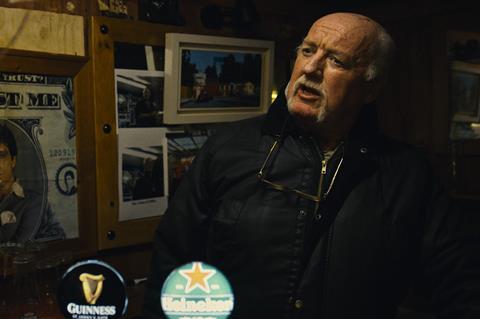Actor John Connors goes behind the camera to tell a story of generational neglect and abuse set in Dublin’s inner city

Dir: John Connors. Ireland. 2022. 125 mins.
Life for a young man in the tough, impoverished neighbourhood of Dublin where this gritty drama is set is like getting caught in a bucket of crabs. Or so says the granite-faced landlord of the local pub where drug dealer Kanto (Graham Earley) and his reprobate buddies drink. No sooner has one crab climbed to the top, tantalisingly close to escape, than the others pull it back down again. It’s a neat metaphor for this hard-hitting tale of abuse, addiction and generational trauma, and one which works rather better than the slightly laboured references to Dante’s Inferno which give the film its enigmatic title. It’s a little rough around the edges but there’s no denying the film’s unflinching potency.
A fiercely authentic portrait of Ireland’s underclass, of families that bear the persistent scars of the brutal Industrial School system
This is the first feature from actor-turned-director John Connors, who hails from the Irish Traveller community. It’s a fiercely authentic portrait of Ireland’s underclass, of families that bear the persistent scars of the brutal Industrial School system. The picture premiered at Germany’s Oldenburg Film Festival, where it won Best Film and Best Actor for Earley. Going forward, it could find a warm reception domestically, possibly connecting with the disenfranchised young males whose stories are rarely told honestly and could serve to further the conversation about child abuse in Catholic Church-run institutions.
Kanto, a small-time drug dealer in Dublin’s Sheriff Street, has been kicked out by his girlfriend Rachel (Lauren Larkin), the mother of his toddler daughter. His reaction veers between pleading, wheedling promises and scorched-earth physical threats, depending on the concentration of cocaine that’s circulating in his system at any given time. To further complicate matters, he owes money to the kind of people you really don’t want to cross (director Connors is genuinely terrifying in a supporting role). Meanwhile, his estranged father Dan (Paul Roe) reappears in his life – we assume he’s just been released from prison – but the reunion comes too late to make much of a difference for either.
With his careworn charisma, Roe is impressive as Dan. He is drawn back to a derelict building that has fallen into disrepair following years of neglect – an effective visual metaphor for the family relationships that Dan, a survivor of horrific sexual abuses at the residential school he attended, never felt capable of maintaining. Rebuffed by his son, Dan sleeps rough and encounters a pure-spirited youth named Virgil (Tony Doyle). Virgil, a student of astrophysics, is the only character who seems able to look up and beyond the relentless suck of the streets. Through Virgil’s kindness, and that of his struggling, smack-addicted mother Beatrice (Denise McCormack), Dan starts to patch up some of the frayed holes in his life.
Connors’s approach is effectively intense – he combines the social realism of Loach with a Safdie brothers-esque nervy urgency – in the duck and weave of the camera and the propulsive self-destruction of the characters, there’s a definite kinship with the Safdies’ story of doomed addicts, Heaven Knows What. The score is equally effective – a thunderous blend of war drums and pulsing blood captures the simmering anger which is a constant in Kanto’s life. But Connors also allows his characters glimpses of creative escape – there’s a striking and powerful scene in the shitty little pub where the lads waste their lives when one of them recites his latest rhyme. Time stops for a moment and there’s a stab of clarity that unites these young men as they listen to the stark details of their inherited plight laid bare.
International sales, Studio Dome - info@StudioDome.com
Producers: Tiernan Williams, Maria O’Neill
Screenplay: John Connors, Tiernan Williams
Cinematography: Carl Quinn
Editing: Tiernan Williams
Music: Daniel Doherty
Main cast: Graham Earley, Paul Roe, Tony Doyle, Denise McCormack, Laura Larkin, John Connors, Kevin Glynn, Casey Walsh






![The Brightest SunScreen[Courtesy HKIFF]](https://d1nslcd7m2225b.cloudfront.net/Pictures/274x183/3/5/0/1448350_thebrightestsunscreencourtesyhkiff_312678.jpg)















![The Brightest SunScreen[Courtesy HKIFF]](https://d1nslcd7m2225b.cloudfront.net/Pictures/100x67/3/5/0/1448350_thebrightestsunscreencourtesyhkiff_312678.jpg)

